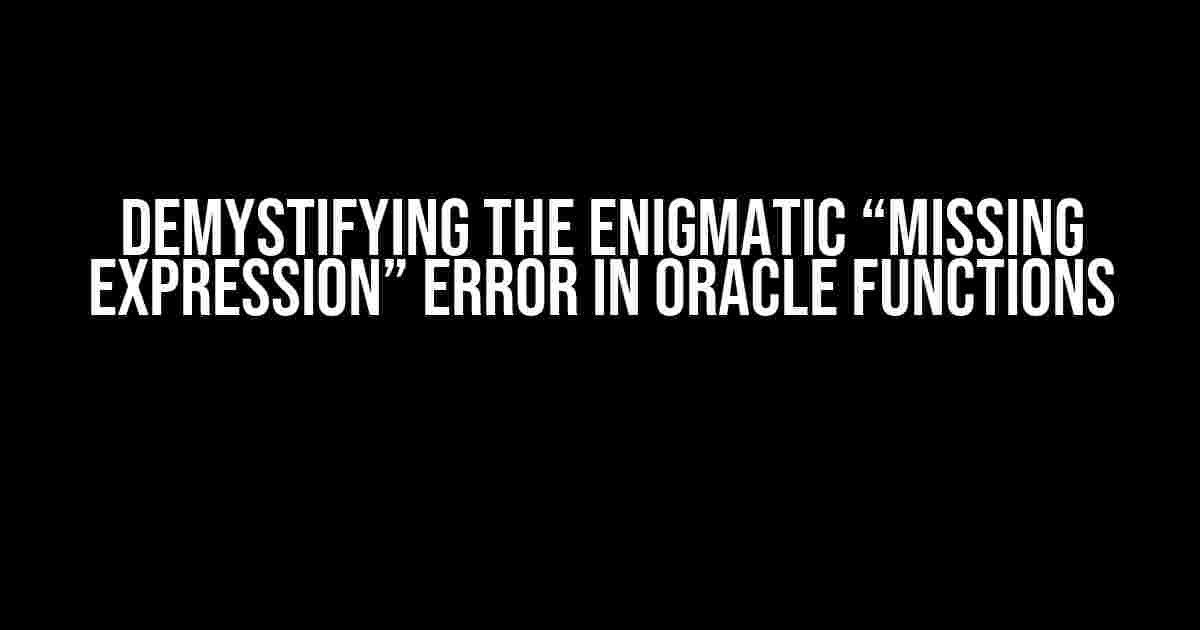Are you tired of scratching your head over the infamous “Missing Expression” error in Oracle functions? Do you feel like you’ve tried every possible solution, only to end up with the same frustrating result? Fear not, dear reader, for we’re about to embark on a journey to conquer this enigmatic error and emerge victorious!
Understanding the “Missing Expression” Error
The “Missing Expression” error typically occurs when Oracle’s parser is unable to identify a valid expression in your function. This can happen due to various reasons, and we’ll explore them in-depth shortly. But first, let’s take a look at a simple example to illustrate the issue:
CREATE OR REPLACE FUNCTION get_total(p_id IN NUMBER)
RETURN NUMBER
IS
BEGIN
RETURN FROM my_table WHERE id = p_id;
END get_total;
/
Compiling the above function will result in the dreaded “Missing Expression” error. But why? Well, Oracle is expecting an expression, such as a SELECT statement, after the RETURN keyword. In this case, we’ve simply omitted it.
Common Causes of the “Missing Expression” Error
Now that we’ve seen a basic example, let’s dive into the common causes of this error:
- Missing or Incorrect SELECT Statement: As we’ve just seen, omitting or incorrectly formatting the SELECT statement can lead to the “Missing Expression” error.
- Incomplete or Malformed Expression: If your expression is incomplete, malformed, or contains syntax errors, Oracle will raises this error.
- Unbalanced Parentheses or Quotes: Unbalanced parentheses, quotes, or other characters can confuse Oracle’s parser, resulting in the “Missing Expression” error.
- Invalid Data Types: Using incompatible data types or trying to return a value of the wrong type can cause this error.
Solving the “Missing Expression” Error: Step-by-Step
Now that we’ve identified the common causes, let’s walk through a step-by-step process to resolve the “Missing Expression” error:
- Check the SELECT Statement: Ensure your SELECT statement is complete and correctly formatted. Verify that you’re selecting the correct columns and using the right joins, if necessary.
- Review the Expression: Carefully examine your expression for any syntax errors, incomplete statements, or malformed logic.
- Balance Parentheses and Quotes: Double-check that your parentheses and quotes are balanced and properly nested.
- Verify Data Types: Confirm that you’re using compatible data types and returning the correct type of value.
- Test and Refine: Test your function with sample data and refine your code until the error disappears.
Real-World Examples and Solutions
Let’s take a look at some real-world examples and their solutions:
| Example | Error | Solution |
|---|---|---|
|
Missing Expression |
|
|
Invalid Data Type |
|
In the first example, we’ve added a SELECT statement to retrieve the name column from the my_table table. In the second example, we’ve corrected the data type mismatch by declaring a variable to hold the result of the SUM aggregation function.
Best Practices for Avoiding the “Missing Expression” Error
To avoid the “Missing Expression” error in the future, follow these best practices:
- Test Thoroughly: Always test your functions with sample data to catch errors early.
- Use a Consistent Coding Style: Maintain a consistent coding style to reduce errors and improve readability.
- Validate Your Expressions: Validate your expressions and statements using tools like Oracle’s SQL Developer or online syntax checkers.
- Keep it Simple: Break down complex logic into smaller, manageable chunks to reduce the likelihood of errors.
By following these guidelines and understanding the common causes of the “Missing Expression” error, you’ll be well-equipped to tackle even the most challenging Oracle function issues.
Conclusion
We’ve demystified the enigmatic “Missing Expression” error in Oracle functions, explored its common causes, and provided step-by-step solutions to resolve it. By applying the knowledge and best practices discussed in this article, you’ll be able to create robust, error-free Oracle functions that meet your business needs.
Remember, a well-crafted Oracle function is like a symphony – each piece must work harmoniously together to produce a beautiful result. So, go ahead, compose your masterpiece, and let the music of Oracle functions play on!
Happy coding!
Frequently Asked Question
Get answers to your most burning questions about missing expressions in Oracle functions!
What happens when I miss an expression in an Oracle function?
When you miss an expression in an Oracle function, the function will not compile and will throw a syntax error. This is because Oracle requires a complete and valid expression to execute the function correctly.
How do I troubleshoot missing expressions in an Oracle function?
To troubleshoot missing expressions, start by reviewing the function code line by line, looking for any syntax errors or incomplete expressions. You can also use Oracle’s built-in debugging tools, such as the DBMS_OUTPUT package, to help identify the issue.
What are some common causes of missing expressions in Oracle functions?
Common causes of missing expressions include typos, missing parentheses, or incorrect syntax. Additionally, missing or mismatched data types, incorrect function signatures, or incomplete logic can also lead to missing expressions.
Can I use Oracle’s PL/SQL compiler to detect missing expressions?
Yes, Oracle’s PL/SQL compiler can detect missing expressions and report syntax errors. You can use the SHOW ERRORS command to display the compilation errors and warnings.
How can I prevent missing expressions in Oracle functions?
To prevent missing expressions, it’s essential to follow best practices, such as using thorough testing, code reviews, and_version control. Additionally, using Oracle’s built-in debugging tools and compiler warnings can help identify and prevent missing expressions.


